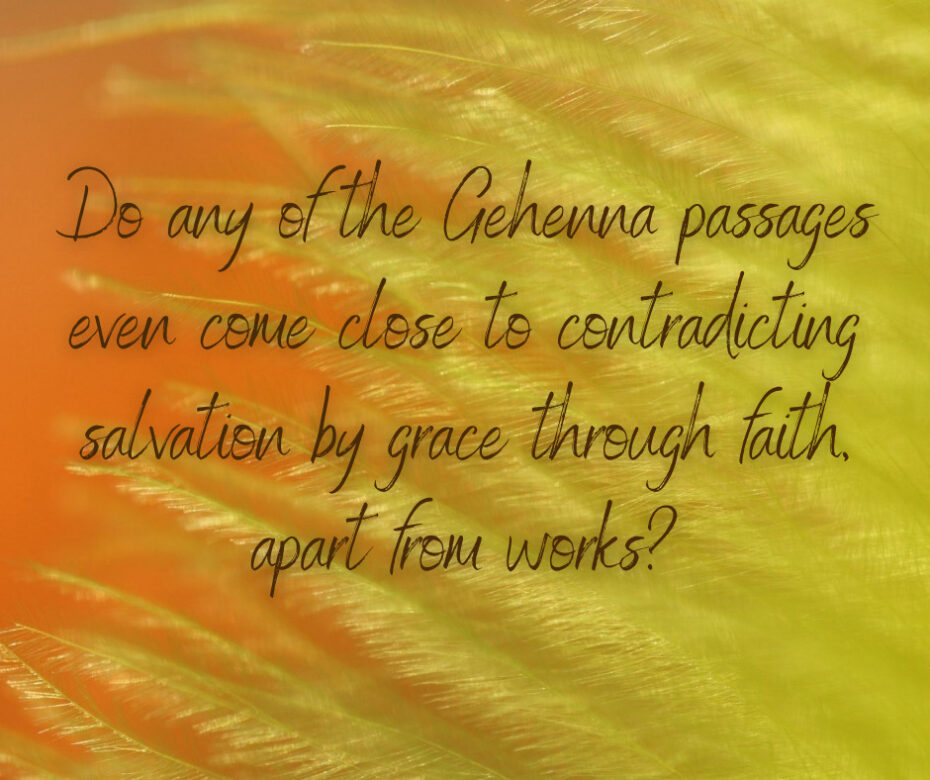Recently I wrote a blog on Gehenna (see here) in which I suggested that it might be another name for the lake of fire where the unsaved dead will be forever.
I received some rather animated objections from quite a few readers.
While none of them said why they were so disturbed by my blog, I think it is because some of the passages suggest that in order to avoid Gehenna, one would be better off to cut off his hand, cut off his foot, or pluck out his eye. They understand those things not to be literal, but figurative. I do too. We are to eliminate anything that could cause us to experience Gehenna in the future. They evidently understand the things being eliminated as sinful deeds. So, in their minds, if Gehenna refers to the lake of fire, then the Lord would be saying that one must abandon his sinful deeds in order to avoid eternal condemnation. That would, of course, be a contradiction to the faith alone message of John 3:16 and a hundred-plus other NT verses.
So, this blog is a follow-up to the earlier one. In this blog, I want to clarify some issues.
First, we know with certainty that the sole condition of everlasting life that can never be lost is believing in the Lord Jesus Christ (John 3:16; 5:24; 6:47). No other text can contradict that. No other text does contradict that.
Second, we know that the word Gehenna is most likely from the Hebrew ge hinnom, meaning Valley of Hinnom.
Third, we know from Scripture that in the Valley of Hinnom human sacrifices were once burned with fire in Israel (2 Kings 23:10; 2 Chron 28:3; 33:6; Jer 7:31).
Fourth, it is a matter of speculation as to what Gehenna represents. What does the burning with fire in the Valley of Hinnom suggest? It might suggest the eternal torment of unbelievers in the lake of fire. But it might also suggest temporal judgment in this life.
Fifth, we know in Mark 9:43-50 (see also Matt 5:21-26) that the Lord three times cites the last line from the Book of Isaiah: “It is better to enter into life maimed, rather than having two hands, to go to hell [Gehenna], into the fire that shall never be quenched ‘Their worm does not die And the fire is not quenched—where ‘Their worm does not die And the fire is not quenched’” (Isa 66:24). While that verse can be understood as looking merely at the temporal results of the battle at the end of the Millennium, it is possible that eternal condemnation in unquenchable fire is in view.
Is it really a problem for Free Grace Theology (FGT) if Mark 9:43-50 suggests that it might be necessary for an unbeliever to abandon something he is seeing (eyes), somewhere he is going (feet), or something he is doing (hands) in order to be in a position to hear the promise of life so that he might believe it and be born again? I think not.
Is it really a problem for FGT if Matt 5:21-26 indicates that during the Millennium if someone is angry with his brother without cause, he would be liable to temporal judgment? Or that whoever “says to his brother, ‘Raca’ [i.e., numbskull] shall be in danger of the council”? No. Neither of those refers to unbelievers or eternal condemnation. But is it even a problem for FGT if an unbeliever in the Millennium who said, “‘You fool,’” would “be in danger of” eternal condemnation? Notice that in the first two examples in Matt 5:21-26, the Lord refers to someone being angry with his brother or calling his brother a numskull. But in the third example, it is noticeable that the Lord does not refer to calling his brother a fool.
In his book Grace in Eclipse, Zane Hodges suggested that the last example in Matt 5:22 refers to an unbeliever in the Millennium who might experience the death penalty for calling someone a fool. And if an unbeliever dies, then he is off to Hades now and the lake of fire after the Great White Throne Judgment. Hodges wrote:
So strictly will human relationships be governed in the kingdom of God that a man can go on trial for unjustified anger with his brother or for calling him a numbskull (Matt 5:22). When harsher language than that is used, the offender may be liable to immediate banishment into Gehenna (Matt 5:22). Unregenerate inhabitants of the kingdom will be very numerous, as the final rebellion proves. At any time, during the thousand years, the King may send any of them away to this abode of torment to await the judgment of the Great White Throne (Rev 20:11-15) (p. 37, emphasis added).
As I said in my recent blog on Gehenna, I’m open. I do lean toward the view that it refers to the lake of fire. However, my point in this blog is simply this: Even if Gehenna refers to the lake of fire where unbelievers will be tormented forever, no Gehenna passage contradicts the simple promise of everlasting life to all who simply believe in the Lord Jesus for that life.


